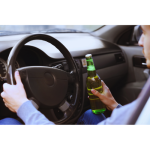The statistics relating to driving under the influence of alcohol and drugs (DUIs) are mind-blowing. For example, nationally, one-in-four drivers confess they’ve driven while drunk at least once, and one-in-ten admit that they regularly drive while intoxicated. According to one analysis, 10% of all criminal arrests are for DUIs. That’s more than all violent crimes—combined. And Arizona is by no means immune. In 2018, law enforcement officers made more than 1 million traffic stops in the state. During those stops, they arrested 27,653 drivers for DUIs.
To combat the danger of DUIs, Arizona has adopted some of the toughest DUI laws in the nation. You should take the charge very seriously if you’re arrested for a DUI here.
But if you’re charged with a Felony DUI, you need to realize that this case can change your life.
Extreme and Super Extreme DUIs Are Not Felonies
First things first. Let’s briefly talk about what is not a felony before we get to what is one.
You may know that a monetary amount or other factor determines whether something is a misdemeanor or felony for other types of crime. For example, petty theft is defined as stealing items worth less than $1,000, and petty theft is a misdemeanor—meaning it is a crime with a punishment of fewer than 365 days in jail. On the other hand, stealing items worth $1,000 or more is a felony—a crime punishable by a year or more in prison. And the length of a possible prison sentence continues to increase as the amount stolen increases.
Given that, it would be logical to think that the greater a driver’s intoxication, the more serious the DUI charge. And eventually, a driver would be so intoxicated that the charge would flip from a misdemeanor to a felony.
But that’s only half-right. Increasing the amount of a driver’s intoxication does increase the potential penalties, but it doesn’t mean that a DUI misdemeanor becomes a felony.
In Arizona, someone can be charged with a DUI for having either impaired ability to drive or a blood alcohol level (BAC) above 0.08. Extreme DUIs and Super Extreme DUIs relate to when a driver has a BAC substantially over that legal threshold. Extreme DUI is the charge for those with a BAC of 0.15-0.19, while a Super Extreme DUI is for those with a BAC of 0.20 or higher.
While Extreme DUIs and Super Extreme DUIs come with more severe penalties than a normal DUI, Extreme DUIs and Super Extreme DUIs are not felony crimes. They are still misdemeanor crimes.
That’s because when someone is charged with a DUI felony, it’s not just because of their level of impairment. It’s that, and they broke another law too.
So one driver with a BAC of .20 could get a misdemeanor charge, while another could face a felony with a BAC of 0.09.
There’s another twist that may help to understand this: Consider that someone under the influence of drugs (not alcohol) can be charged with a normal DUI. But the drug DUI cannot be charged as an Extreme DUI or Super Extreme DUI because the driver’s impairment isn’t measurable through their BAC. But they can be charged with a felony because their other wrongdoing is knowable.
Aggravated DUI
Under Arizona law, a DUI charged as a felony is an “aggravated DUI.”
First and foremost, a DUI can become an aggravated DUI if the driver has already been involved in another DUI. Specifically, a DUI can be charged as an aggravated (i.e., felony) DUI if any of the following apply:
- The driver’s DUI occurred while their license was still canceled, suspended, revoked, or restricted because they’d been convicted of an earlier DUI
- This is the third (or subsequent) DUI violation within 84 months
- The driver commits a DUI when they are still required to use a certified ignition interlock device because of an earlier violation
Additionally, a DUI can become a felony for other wrongdoing related to the DUI.
It’s an aggravated DUI when the driver is driving under the influence and has a passenger under the age of 15 in the car.
It’s also an aggravated DUI if an intoxicated driver drives the wrong way on a highway.
Aggravated Assault / Aggravated Vehicular Assault
Most drivers charged with a DUI-related felony will probably be charged with multiple other felonies. And some of these charges will be escalated because of the driver’s driving under the influence.
For example, a sober driver who hurts someone in a car accident can be charged with assault. But a driver under the influence can be charged with aggravated assault. Similarly, a driver can see increased charges and punishment for a DUI-related fatal accident.
Punishment for Aggravated DUIs
Prison sentences are mandatory for a Class Four aggravated DUI conviction. The presumptive (average) sentence is for two and a half years. Prison sentences can be shortened with probation—but even those on probation still must serve at least four months in prison.
For subsequent aggravated DUI convictions, the prison terms increase. For a third conviction, a prison sentence can range from six to 15 years.
Drivers convicted of an aggravated DUI may also see other punishments beyond their incarceration, including:
- fines and reimbursements
- revocation of their driver’s license
- installation of an ignition interlock device
- participation in a substance abuse program
Beyond the formal penalties, those with a felony DUI will face other impacts, too. For example, those who have professional licenses may lose their licenses. College students may lose their place in their universities.
And every driver with a DUI conviction should expect to pay hundreds more in insurance.
That’s why, as we said at the beginning, take it very seriously if you have been charged with any DUI—whether it’s a felony or a misdemeanor.
It’s a charge that can impact the rest of your life. So don’t wait. Get an attorney to represent you as soon as possible. Contact our office (by phone at: 602-548-3400) to schedule an initial confidential consultation with one of our attorneys and discuss your case. Call today.
Colin Bell is a DUI and Criminal Defense attorney in Phoenix, Arizona. He is Of-Counsel with Stewart Law Group with offices throughout Arizona. The firm has helped many clients navigate the legal complexities of DUI and criminal defense.




